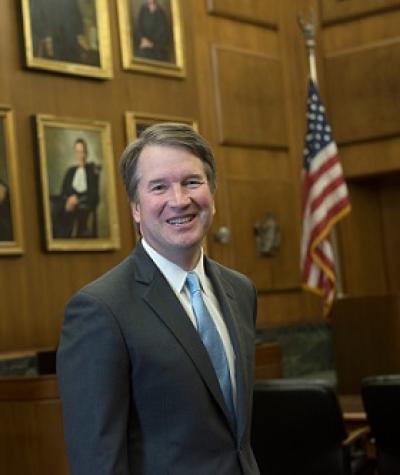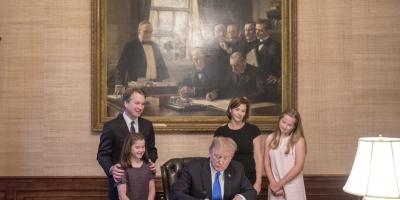In a 2011 decision, Judge Brett Kavanaugh went out of his way to cut back a statutory prohibition on foreign campaign spending, creating an opening for the Russian government and other foreign actors to influence U.S. elections. Recently-released emails provide insight into why.
The decision, Bluman v. FEC, was a challenge to federal law’s broadly-worded ban on foreign nationals “directly or indirectly” spending any money “in connection with” a federal, state, or local election. The case was brought by two foreign nationals who wanted to contribute to candidates and to spend money on ads expressly advocating for President Obama’s re-election.
Judge Kavanaugh’s majority opinion upheld the ban—but interpreted it so narrowly as to allow foreign governments and individuals to secretly spend millions influencing U.S. elections by carefully avoiding phrases like “Vote for Clinton.”
Kavanaugh’s opinion declared that “[t]his statute, as we interpret it, does not bar foreign nationals from issue advocacy—that is, speech that does not expressly advocate the election or defeat of a specific candidate.”
In doing so, Judge Kavanaugh may have placed the majority of Russia’s ads in the 2016 elections beyond regulation—such as ads seeking to incite division on the bases of race and religion, or that skirt the line of express advocacy but attack candidates with messages like “Hillary is Satan,” or that targeted people of color with voter suppression messages like “No one represents Black people. Don’t go to vote.”
Kavanaugh didn’t need to narrow the reach of the law. None of the plaintiffs in this case wanted to run issue ads.
So why did he do it?
Recently-released emails from Kavanaugh’s time in the George W. Bush White House might provide the answer: the nominee personally believes that regulating anything other than so-called express advocacy is “blatantly unconstitutional.”
The emails, from the period that Kavanaugh was advising Bush on the McCain-Feingold law, reveal his deep skepticism of any limits on money in politics whatsoever.
Kavanaugh told another advisor that his views on the First Amendment and campaign finance were “pure” and expressed his uniquely-held opinion that, while “very few people” take the position that limits on direct contributions to candidates are unconstitutional, “I for one tend to think those limits have constitutional problems.”
In the emails, Kavanaugh discusses the McCain-Feingold law’s effort to close the so-called “issue ad” loophole.
Throughout the 1980s and 1990s, corporations and unions had evaded federal campaign finance law by spending millions on thinly-veiled election ads supporting or attacking candidates, but which were carefully worded to avoid expressly advocating for or against those candidates (what Kavanaugh would call an “issue ad”). The 2002 McCain-Feingold law sought to close that loophole by regulating “electioneering communications”—ads that mention candidates, are targeted to their electorate, and are aired shortly before an election, but that stop short of express advocacy.
Kavanaugh acknowledged that the electioneering communication provisions sought to remedy a well-documented problem, but nonetheless declared that “the issue ad restrictions are blatantly unconstitutional.”
Fast forward to Bluman. The foreign national ban explicitly prohibited foreigners from spending money on “electioneering communications”—the same category of speech Kavanaugh privately believed it is “blatantly unconstitutional” to regulate—and could be read to broadly prohibit all foreign spending intended to influence an election. But Kavanaugh nonetheless crafted his opinion to ignore or even negate the application of the foreign national ban to electioneering communications. And he read any “issue advocacy” out of the statute altogether.
Kavanaugh’s narrow interpretation of foreign national ban even casts doubt on whether he would allow Congress to write a new law barring Russia or other foreign actors from repeating 2016.
Senators Whitehouse and Klobuchar both tried pressing Kavanaugh on Bluman during his confirmation hearing, but he largely managed to dodge accountability.
The potential implications of Kavanaugh’s opinion in Bluman were little-noticed at the time. But Russians later got the message.
Kavanaugh’s decision in Bluman was cited by Concord Management and Consulting, one of 16 Russian individuals or companies indicted by a federal grand jury in February, in support of its motion to dismiss the indictment.
The indictment alleged the Kremlin-tied Internet Research Agency paid Concord $1.25 million per month for projects such as creating Twitter and Facebook accounts to spread false information and “to interfere in U.S. political and electoral processes without detection of their Russian affiliation.”
Citing Kavanaugh’s opinion in Bluman, Concord’s attorneys wrote: “Foreign nationals are not barred from issue advocacy through political speech such as what is described in the indictment — they are only precluded from willfully making expenditures that expressly advocate the election or defeat of a particular candidate.”

